 |
||||||||||||||||||||
| Past Issues | Subscribe | Send to a Friend | compostingcouncil.org | ||||||||||||||||||||
|
In a world of rapidly evolving stories and instant status updates from every corner of the world, it is reassuring to know that, when it comes to compost research and education, a steady hand is at the helm. With the leadership of Beth Simone, CCREF Development & Marketing Director, Wayne Howard, CCREF Program Manager and guidance from Ginny Black, Chair and President of CCREF, the steps forward are measured and well thought out. CCREF has made numerous contributions. As all composters work to perfect their recipes and final products, CCREF is in the wings, providing guidance on the long-standing question of soluble salts. Over two years ago, CCREF set out to shed light on this question. Through their research process, the Foundation produced a peer-reviewed paper, now available online. (See article below.) In the middle of a pandemic, CCREF took the time to continue with their training efforts by shifting gears and offering a shorter version of the COTC program. This has become a foundational base for thousands of compost facilities operators across the nation and around the world. Only through the efforts of the entire CCREF staff and board was September's COTC in New Jersey possible. Maintaining safety while containing to provide the coursework for both in-person and virtual attendees was critical. International Compost Awareness Week is the root from which public awareness of compost has grown. Over the past 25 years, CCREF’s week-long event has raised the consciousness of hundreds of thousands of individuals. This coming year will be no different. With the theme Grow, Eat, Compost . . . Repeat, CCREF received over 200 submissions for the annual poster contest and dozens of video submissions from junior composters. This year’s winner elicits only one response – “aww” – and will personify compost in the hearts of the public. (See poster below.) All of this happened because of one small organization with a dedicated staff and board of trustees. The compost industry is fortunate to have such a group of individuals working day in and day out to educate, train, and inspire. It is with that in mind that we are asking you to consider donating to support this organization to help maintain the integrity and identity of the industry. – Frank Franciosi
Chick-Fil-A: CSR program leader Dawn Rhodes has attended several USCC conferences to prepare their company to expand composting across the U.S. She participated in providing data for last year's Corporate White Paper. Mars, Inc.’s Eric Klingenberg, Materials Science Lead, has been researching recyclability and compostability to meet the company’s sustainable packaging goals; he has most recently been involved in recyclability of the company’s pet care product packaging. Clif Bar: Carolina Leonhardt and Elysa Hammond have also been USCC conference visitors as part of their research to increase compostability of Clif Bars’ product packaging. They said they are excited to dive in and learn from composters and provide feedback about their challenges. The CCLC meets each quarter to discuss issues; in November, the group heard from Jeff West of Olympic Organics about “The Bin Decision” (consumer choices and education about compostables) and the impact of contamination on compost manufacturers. Wendell Simonson of BPI also spoke about the new BPI guidelines. The CCLC’s next event will be a Workplace Composting panel at COMPOST2021 on January 26, featuring speakers from The Kansas City Chiefs, Club Coffee (a CCLC member) and Sutter Health, a health system in California that has deployed composting in its hospitals. For more info about CCLC visit www.compostingcouncil.org.
Kathy Kellogg Johnson will host this closing plenary interview and live Q&A session, which will be the public's opportunity to hear Paul discuss his work and its relation to the compost industry.
Paul has appeared in numerous media including the Today Show, Bill Maher, Larry King, Talk of the Nation, Charlie Rose, and has been profiled or featured in hundreds of articles including the Wall Street Journal, Newsweek, Washington Post, Business Week, Esquire, and US News and World Report. His writings have appeared in the Harvard Business Review, Resurgence, New Statesman, Inc, Boston Globe, Christian Science Monitor, Mother Jones, Orion, Libération, and other publications.
VIRTUAL COMPOST2021 – Sharing Local Solutions Globally is the USCC's 29th Annual Conference, where compost manufacturers, affiliates, equipment manufacturers, consultants, allies, and partners in the industry gather for a virtual tradeshow and conference bringing 37 speakers over three targeted tracks. Registration is open; for more information see www.compostconference.com.
Last year’s third place winner FAZ VERDE has been using their winnings to “implement a meteorological station that assesses the environmental conditions around their operations and analyzes gases (ammonia and CO2) to validate the composting phases.” APPLY TODAY! Finalists to present at USCC Virtual Annual Conference, January 26-27, 2021. Hosted by the US Composting Council and the Composting Council Research & Education Foundation; Sponsored by Bio Bag, McGill Soil Builder Compost, Beyond Green Biotech.
The Legislative and Environmental Affairs Committee (LEAC) tackled several issues in the past two months, recommending USCC policy stances in the following areas:
Fischer said DEP estimates 310,000 tons of food material were diverted from disposal in 2019 (a tripling of the amount diverted under voluntary diversion.) The number of businesses with separate food waste collection increased form 1,350 in 2014 when the one-ton threshold was implemented to 2,900 in 2019. Fischer said food rescue and donation has also grown. Unfortunately, composting has not grown due to sites having had operational issue and odor complaints, so more food scrap has instead been going to dairy farm anaerobic digestion. USCC submitted a letter in support of lowering the threshold for the comment period ended December 4. See the letter here.
That’s why USCC has signed onto a letter urging that the Lower East Side Ecology Center and Big Reuse Queens sites continue their long-term operations, which DSNY is proposing to close. Visit SaveOurCompost to find out how you can support this campaign.
“As documented in the comments received from home gardeners in the PID of Clopyralid and in the cases reported through our confidential reporting form, these herbicides are clearly having negative economic and social impacts,” the letter stated. The existence and use of persistent herbicides in horticulture have, for several years, presented a challenge to the composting industry’s reputation.
The USCC is taking many approaches to tackling the persistent herbicide issue: forming a task force, creating information sheets, supporting research into affordable lab test methods, applying for grants to support education/research/policy efforts, soliciting case study information, directly communicating with the EPA, and opposing the EPA’s renewal of specific key problematic persistent herbicides. Additionally, enhancing the USCC’s information disclosure program housed within the USCC’s Seal of Testing Assurance (STA) Program is underway as a vital initiative.
STA Certified Compost is a contractually-based information disclosure program (i.e., manufacturers’ accountability). Compost manufacturers in this program must meet the USCC’s definition of compost, test their compost frequently on a program-defined sampling procedure and schedule, and share their feedstocks and results with their customers. They must be permitted (as required) and in compliance with all permit requirements, use only STA-contracted labs that are subject to routine proficiency testing, employ specified lab Test Methods for the Examination of Composting & Compost (TMECC), and meet EPA requirements for product safety (pathogens and trace metals).
The USCC is clarifying Seal of Testing Assurance (STA) Program procedures as we continue to improve and grow participation. We have recently upgraded our STA map and list. Now anyone can see your STA products and derivative products listed under each of your STA facilities. Specifiers and participating laboratories will more easily be able to see which products are in the STA program, and which are not. Often multiple products are enrolled by one company, and with the new website we now show more clearly what is enrolled. For STA participants, please ensure when you submit your chain of custody form with your product sample to the laboratory, that the product name on the form matches what you have enrolled in STA, which is reflected on our webpage. The labs will not be able to give you test results on STA-branded Compost Technical Data Sheet (CTDS) paperwork if these product names do not match. If you have any concerns or need clarifications, want to add products or correct your STA registration, please contact STA Program Manager Hilary Nichols.
Bruckman is a twice-published author and the co-chair of the Colorado Compost Council, a chapter of the US Compost Council. She teaches compost, recycling and soil biology lessons for all ages and sits on boards for organizations with missions that support soil health, water conservation and sustainable food systems. Shawn believes that composting is the ultimate closed loop nutrient management system for communities to fortify local food, improve public health and combat climate change! Bruckman says, "I chose to pursue the Compost Operations Manager Certification because I believe that the standardized trainings and education provided by USCC and CCREF are invaluable for the compost industry. When I took the Compost Operator Training Course, I was inspired by the level of professionalism and structure the USCC has been able to articulate around the work I do every day. I feel that good leaders never stop learning and there is so much knowledge to gain and share when we collaborate with fellow composters."
Alan Schumacher, President of the IRA said, "It just makes sense. The IRA is here to promote recycling. Organics are the largest waste stream in Iowa. Of course, we should promote the recycling of organics through composting. It's a perfect fit." The group, which is seeking Iowa members, will educate state regulators, local officials and the public about the importance of the compost manufacturing industry to local waste management programs, jobs and business development as well as the benefits of using compost in commercial and residential landscaping and farm fields. Educational outreach will also include the benefits of using compost for storm water management, erosion control and green infrastructure. The IACC, IRA and USCC will jointly take positions on regulations and legislation that affect the industry and the market for compost in the state. “The USCC – and the compost industry – is most effective in states where a local and organized industry group is at the table,” said Frank Franciosi, executive director of the USCC. “Our chapters are important because their leadership is directly in touch with the members we work to serve.” The Iowa Composting Council becomes the 13th regional chapter of the USCC after stakeholders in Iowa identified a need to provide training to compost operators, as well as education promoting compost benefits with the potential to grow current composting infrastructure in the state. Currently, the IRA is soliciting nominations for officers to serve on the IACC subcommittee. For more information about the Iowa Composting Council, contact Jennifer Trent at jennifer.trent@uni.org. Two USCC Chapter leaders – Monique DiGiorgio and David Fridland – have been elected to the Recycle Colorado board! Congratulations! Here are the candidates selected to the 2021 Board of Directors: ● Monique DiGiorgio, Table to Farm Compost ● David Fridland, Eco-Products, PBC ● Sarah B. Jones, Steamboat Ski & Resort Corporation ● Charlie Kamenides, City of Longmont ● Jessica Lally, City & County of Denver ● Neil Noble, Republic Services Brand new to the board, DiGiorgio and Sarah B. Jones introduce a rural and mountain perspective, though from almost opposite ends of the state, along with Jessica Lally, who will represent Colorado’s major population center. The newly elected directors will join current Board members Alicia Archibald with Kessler Consulting, Tim Dailey with Waste-Not Recycling, Jenifer Freeman with Swire Coca-Cola, Brandy Moe with PaintCare, Randy Moorman with Eco-Cycle, Ally Palmer with Clean Valley Recycling, Tom Sisnroy with MolsonCoors Beverage Company, Lisa Skumatz with SERA, Inc., and Emily Wilson with Colorado Department of Public Health and Environment. “The 2021 Board is a group of specialized leaders who embrace business, community and the environment. It will be my honor to work for them,” said Kristin Kim, Executive Director of Recycle Colorado. “As our industry stays in lockstep with the Governor's plan to build Colorado back even stronger than before, we recognize the importance of keeping Recycle Colorado agile and progressive.” Recycle Colorado is a nonprofit mission-driven organization that works on projects that are tangible, actionable and measurable related to infrastructure and end markets for material recovery, reuse and manufacturing. Our vision is to transform Colorado into a national leader in waste reduction, recovery, and diversion. Learn more at www.recyclecolorado.org.
The Minnesota Composting Council hosted four experts and more than 130 listeners who wanted to learn about local government compost use in a partnership with USCC national, opening it up to chapters and listeners across the country. Speakers were Gregg Thompson, City of Egan, MN Watershed Specialist, Kala Fisher and Joe Shamala of the City of St. Louis Park, MN, and Chuck Joswiak of Specialized Environmental Technologies in Minnesota. During the two-hour webinar they explored various types of government projects using compost and equipment used for application, testing, contamination, procurement and other issues. The interest in the topic was apparent with more than 100 people staying for nearly the entire webinar. Ginny Black, chair of the MNCC, and a webinar committee made up of Mikala Larson, Carver County, Georgie Lellman of Minnesota Pollution Control Agency, and Kellie Kish, City of Minneapolis, designed and moderated the webinar, with technical sponsorship from USCC. This was their first webinar, so it was free; the committee is evaluating future webinars and their potential availability. To learn about the webinar’s content, visit the Minnesota chapter website; the recording should be available soon. For any other chapters interested in using USCC’s Zoom Platform or technical expertise, contact Linda Norris-Waldt, Chapters Director.
Feel free to join and hear about Michael's community compost pickup program and shoot the (compost) with long-time industry champion Linda Norris Waldt. Let's face it ... it's going to be the Friday before the Christmas holiday, and you will just be counting the last hour of the day down anyway. Kick back with a beer or ginger ale and pass the time a little faster. Register in advance for this meeting.
The Normec Group (Normec) is pleased to announce that it has signed a definitive agreement with the shareholders of Organic Waste Systems (OWS) concerning the acquisition of OWS. Normec is active in the field of testing, inspecting, certification (TIC) and compliance mainly in the Netherlands, Belgium and Germany with more than 1100 employees. OWS will continue to grow on an independent basis in cooperation with Normec.
BASF and the Swedish packaging manufacturer BillerudKorsnäs have cooperated to develop a unique home-compostable paper laminate for flexible packaging. The multi-layer film consists of three basic components: BillerudKorsnäs‘ paper ConFlex® Silk, a sealing layer made of BASF’s certified home compostable and partly bio-based biopolymer ecovio® and BASF’s water-based adhesive Epotal® Eco 3675 X which joins the film to the paper. As all parts of the multi-layer laminate are food-contact approved, it can be used to produce wraps with individually adjusted barrier properties, e.g. for cookies, ice cream, cereal bars and dairy items as well as wrappers for fish, meat and cheese freshly sold in supermarkets. All components are certified home-compostable according to official European certification schemes for home-composting. The laminate contains a high share of renewables and extends the end-of-life options for multi-layer flexible packaging by being organically recyclable.
Organizations Dannah Leeman, Western Colorado University Ryan Hugen, Vermeer Corporation Thomas Fazio, Compost Crew John McNamara, CR&R Inc. Kristin Haynes, Recycle Colorado Stuart Klassen, Valley Carriers Ltd. Regina Cagle Irr, EA Engineering, Science, and Technology, Inc., PBC Joseph England, City of Orlando Carolina Leonhardt, Clif Bar & Company Elysa Hammond, Clif Bar & Company Ethan Wolfe, Clairvest Group, Inc. Eyal Yosef, BENEVET Compost Or Ltd. Michael Huber, WLMC LLC Brian Sims, Vision Recycling Joe Jankowski, Total Corbion PLA Virginia Thompson, NatureWorks, LLC Jamie Blanchard-Poling, Compost Queen PBC Darla Arians, Boulder County Resource Conservation Division Individual Justin Dewey Dana Brown Sheila Prior Patrick Kline
Rotochopper has reached an exciting milestone as the company celebrates 30 years of delivering innovative waste grinding solutions. Through Rotochopper’s offerings, companies have been able to find solutions that turn everyday waste materials into profitable end products like colored landscape mulch, animal bedding, compost, and more.
The Rotochopper brand has long been synonymous with “Perfect In One Pass” grinding precision and simplicity. But the history behind the Rotochopper name is much more than innovation in grinding equipment. It’s about a group of people with a different philosophy toward waste materials and a unique focus on customer success. The Rotochopper brand began when two companies fro m different industries joined forces to manufacture unique recycling equipment. Our co-founders, Fred Peltz and Vince Hundt, established our core values of customer-centricity and “Perfect In One Pass” engineering that continue to define Rotochopper today.
CCREF’s webinar on the soluble salt paper was held December 9. It was recorded, and the recording will available on Monday, December 14 on the CCREF website and for sale in the CCREF store. Thank you to everyone who attended the webinar and to WeCare Denali for being the sponsor of the webinar.
Out of hundreds of entries from around the world, Anastasia Skachko is the winner of the poster contest. She is a self-taught freelance digital artist from Kaliningrad, Russia. This is how she described what she was thinking about when she did her poster design: “I imagined compost as cute little creatures who share their love with plants and vegetables, which help them grow.”
Offered for the first time to children and teens in grades 4-8, Addy Ackerman-Leist is the winner of the video contest. Addy is 11 years old and lives on a farm in Pawlet, Vermont. Addy loves to cook and pick vegetables out of the garden and sees compost as just a normal part of that whole cycle. You can see Addy’s video here: https://youtu.be/Lk6-EnNjxIE.
As most nonprofits know, 2020 has not been an easy year for fundraising. To help raise funds to keep all of CCREF’s programs and projects continuing and adding more into 2021, the Foundation is going to hold an online silent auction leading up to and during the VIRTUAL COMPOST2021. We’ve already had some amazing items donated to the auction, thank you to everyone who donated something to date, but we could use a few more donations. If your company or if you have something that you think would make a great silent auction item, let Beth Simone know at bethsimone@compostfoundation.org. Source: Environmental Protection Agency
Compost is organic material that can be added to soil to help plants grow. Food scraps and yard waste together currently make up more than 30 percent of what we throw away, and could be composted instead. Making compost keeps these materials out of landfills where they take up space and release methane, a potent greenhouse gas.
Source: Natural Resources Defense Council
Since 2018, the City of Baltimore, NRDC, and a breadth of local partners have worked together to curb food waste through a project called Food Matters. The first thing that pops into most people’s heads when thinking about food waste is composting – naturally! It’s the easiest to imagine; it’s tangible. But, we know that preventing food waste from happening in the first place, versus composting food waste, actually has more environmental and climate benefits, in addition to being the most effective cost-saving measure available to businesses and consumers.
|
||||||||||||||||||||

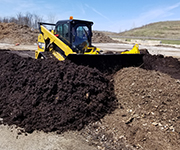
 Three new members have joined in the past quarter to underwrite and participate in projects tackling contamination, packaging and infrastructure gaps in the compost industry. We welcome Chick-Fil-A, Mars, and Clif Bar to the Corporate Compost Leadership Council (CCLA).
Three new members have joined in the past quarter to underwrite and participate in projects tackling contamination, packaging and infrastructure gaps in the compost industry. We welcome Chick-Fil-A, Mars, and Clif Bar to the Corporate Compost Leadership Council (CCLA). Paul Hawken, New York Times bestselling author and founder of Project Drawdown, will be the USCC's keynote speaker for VIRTUAL COMPOST2021 – Sharing Local Solutions Globally. Thanks to
Paul Hawken, New York Times bestselling author and founder of Project Drawdown, will be the USCC's keynote speaker for VIRTUAL COMPOST2021 – Sharing Local Solutions Globally. Thanks to  Paul Hawken
Paul Hawken Thank you to WeCare Denali for sponsoring the Closing Plenary session. The Closing Plenary session will include the keynote, announcement of the Emerging Composter Competition winner and a Virtual Happy Hour.
Thank you to WeCare Denali for sponsoring the Closing Plenary session. The Closing Plenary session will include the keynote, announcement of the Emerging Composter Competition winner and a Virtual Happy Hour. The 2021 USCC Virtual Emerging Composter Competition application process closes today!
The 2021 USCC Virtual Emerging Composter Competition application process closes today!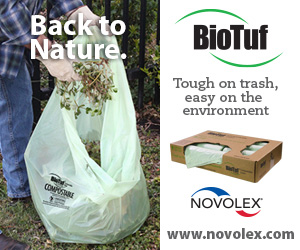
 John Fischer, Massachusetts Department of Environmental Protection (DEP), visited LEAC in November to discuss a proposed regulatory change that lowers to .5 tons (effective October 21) the weekly generation rate of food waste for businesses to comply with a ban on organics from Massachusetts landfills. The current threshold is one ton, a drop from the original 2014 regulation of a two-ton threshold.
John Fischer, Massachusetts Department of Environmental Protection (DEP), visited LEAC in November to discuss a proposed regulatory change that lowers to .5 tons (effective October 21) the weekly generation rate of food waste for businesses to comply with a ban on organics from Massachusetts landfills. The current threshold is one ton, a drop from the original 2014 regulation of a two-ton threshold.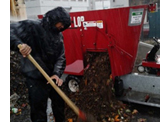 Community Composting is a vital element of NYC’s infrastructure, as well as of the infrastructure of many other geographic locations around the country. Several USCC members over the years are and have been part of this work.
Community Composting is a vital element of NYC’s infrastructure, as well as of the infrastructure of many other geographic locations around the country. Several USCC members over the years are and have been part of this work. USCC
USCC  Shawn Bruckman is the Compost Operations Manager for Vail Honeywagon Organics, a Class III commercial compost facility owned by Waste Connections and nestled in the heart of Colorado’s Rocky Mountains.
Shawn Bruckman is the Compost Operations Manager for Vail Honeywagon Organics, a Class III commercial compost facility owned by Waste Connections and nestled in the heart of Colorado’s Rocky Mountains.

 All USCC members – please join us for the final Compost Conversation of the year. Michael Robinson, co-founder of Rust Belt Riders, and Linda Norris-Waldt, Advocacy & Chapter Relations for US Composting Council, will be kicking back and sharing a drink on Friday December 18 at 4 p.m. EST.
All USCC members – please join us for the final Compost Conversation of the year. Michael Robinson, co-founder of Rust Belt Riders, and Linda Norris-Waldt, Advocacy & Chapter Relations for US Composting Council, will be kicking back and sharing a drink on Friday December 18 at 4 p.m. EST.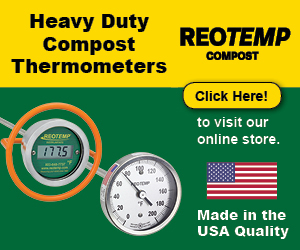

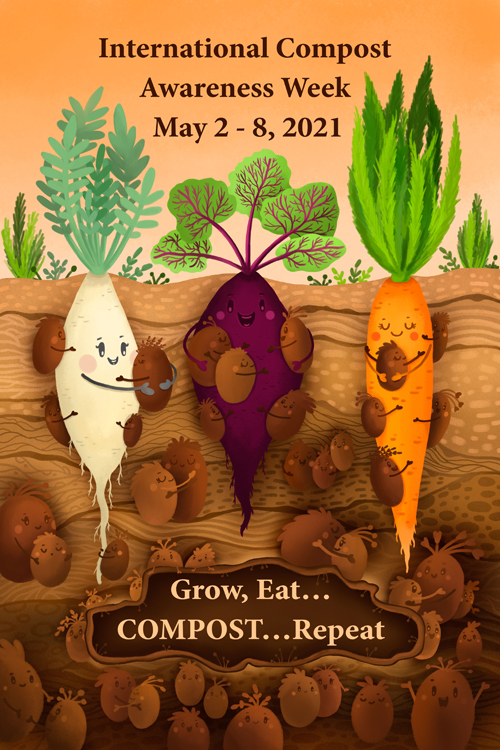
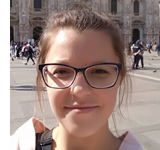 Poster Contest
Poster Contest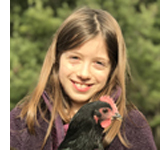 Video Contest
Video Contest